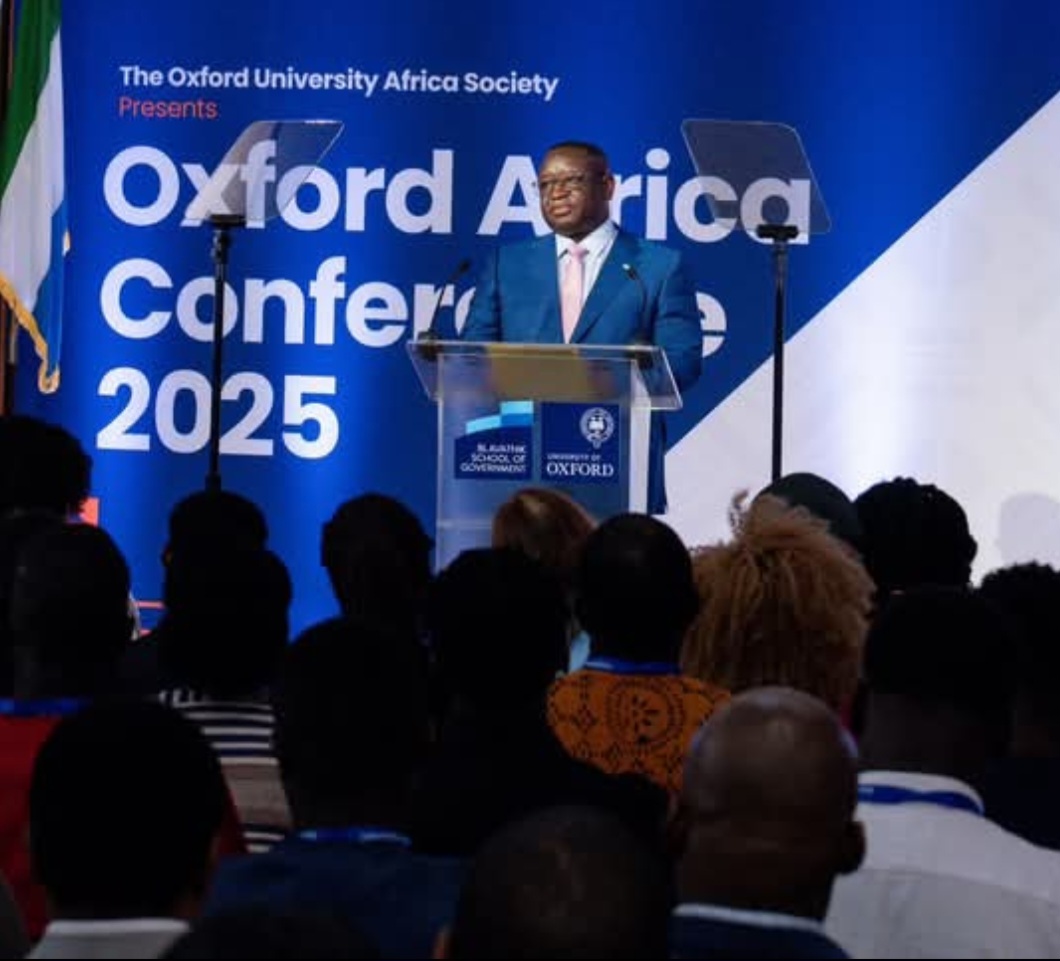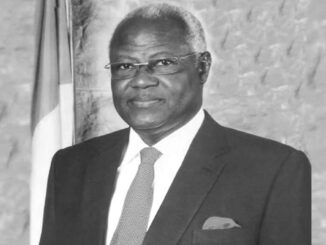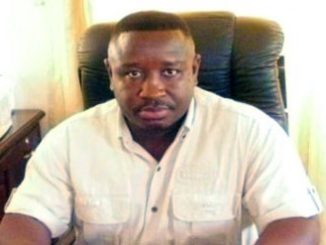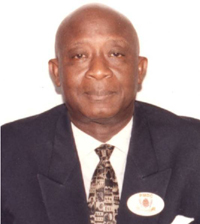
*FROM OXFORD TO FREETOWN: ASSESSING THE ALIGNMENT BETWEEN PRESIDENTIAL RHETORIC AND NATIONAL POLICY*
By Mahmud Tim Kargbo
Sunday, 24 May, 2025
In an age when African nations are demanding more control over their destinies, President Julius Maada Bio’s speeches abroad often strike a hopeful tone. Yet, these lofty declarations are frequently at odds with the lived realities in Sierra Leone. His recent address at Oxford University, where he spoke passionately about food security, climate resilience, and African agency, rings increasingly hollow in light of his government’s actions at home, marked by constitutional breaches, questionable energy contracts, and a lack of institutional transparency.
At the OpenAg Symposium held at Oxford on 18 September 2024, President Bio declared, “Africa is on the frontlines of the climate crisis.” He warned that the continent, despite its vast natural wealth, risks regressing without urgent action. With 65 percent of the world’s uncultivated arable land, he proposed that Africa could become the “world’s breadbasket” by 2050 through climate-smart agricultural techniques.
He went on to assert that African countries must be central to global discussions on food, water, and energy security. “Africa must be at the forefront, driving innovation, shaping policies, and setting the agenda for a water, energy, and food-secure world,” he said.
(Source: https://statehouse.gov.sl/president-julius-maada-bio-delivers-keynote-address-at-oxford-university-calls-for-integrated-solution-to-food-security-and-climate-change)
However, while these sentiments may impress international audiences, the situation in Sierra Leone tells a different story. A glaring example is the controversial 412 million dollar gas-to-power agreement with Milele Energy, announced in May 2024 and supported by the United States International Development Finance Corporation (DFC). The deal involves constructing a 132-megawatt gas-fired power plant. On paper, it promises improved electricity access, but many have raised eyebrows at both its price and its opacity.
(Source: https://www.dfc.gov/media/press-releases/dfc-sierra-leone-promote-access-reliable-energy-412-million-additional)
According to global standards, the cost of generating one megawatt of gas-fired power typically hovers around 1 million US dollars. At more than triple that benchmark, the Milele deal has raised suspicions of overpricing. If this government claims to operate transparently, the public has every right to ask: why does this project cost so much? Where is the feasibility study? Was there an open bidding process? Most critically, was the agreement ratified by Parliament in accordance with Section 118(1) of the 1991 Constitution, which states: “Parliament shall be the authority for the grant of loans and for the raising of public funds, and shall authorise the terms and conditions of such loans by resolution.”
(Source: https://parliament.gov.sl/dnn5/Portals/0/laws/the-constitution-of-sierra-leone-1991.pdf)
None of these checks appear to have been observed. Civil society actors and local experts have expressed grave concerns, warning that the single-source contract could drive up energy tariffs and worsen economic hardship. Yet, their voices are largely ignored. This, from a government that campaigned on the promise of financial discipline.
In fact, the government’s continuation of the Karpowership deal, while claiming to have negotiated improved terms, has resulted in even higher tariffs than those under former President Ernest Bai Koroma. At the time, Bio and his allies strongly criticised the deal as exploitative and unjustifiable, especially given the poverty levels in Sierra Leone. The irony now is hard to miss.
Another example is the Lungi International Airport terminal, awarded to Turkish firm Summa Group. Valued at 270 million dollars, the project was handed out without any competitive bidding process. Although labelled a Build-Operate-Transfer (BOT) arrangement, there is little clarity on how the project will be financed and repaid. What is clear is that airport users (including ordinary Sierra Leoneans) will bear the brunt of repayment via additional charges.
Likewise, the Feed Salone project, intended to enhance food security, has faced scrutiny for its questionable staffing decisions. Specialists from Eritrea (many reportedly lacking relevant expertise) were brought in to lead areas as critical as soil testing. Local agronomists and civil society groups have warned that, without a rigorous and inclusive approach, the programme could become yet another failed state initiative.
These examples point to a troubling trend: the cost of governance failure is increasingly being passed on to ordinary Sierra Leoneans. Energy tariffs have risen, debt obligations have grown, and faith in public institutions is eroding. The government’s actions appear less aligned with national development and more geared toward satisfying opaque foreign partnerships and internal interests.
Unfortunately, much like the APC government under Ernest Bai Koroma, the majority of SLPP members and supporters remain silent in the face of these troubling developments, waiting for their party to lose power before blaming President Bio for his failures in governance. Some choose silence because they recognise their own unfitness for the positions they currently occupy. Others remain quiet while engaging in bootlicking and sycophancy, hoping to position themselves as President Bio’s successor. They seem to forget that the current actions of this administration may ultimately cost the SLPP its ability to retain power. The truth is, no president remains popular when the majority of citizens live in abject poverty while he and a privileged few enjoy the nation’s resources, offering little more than lip service to the delivery of essential social services.
President Bio must be reminded that leadership is not a selective endeavour where one can choose which problems to solve and which to ignore. True leadership requires a commitment to addressing all the issues known prior to taking office, especially those outlined in the manifesto that earned the people’s trust. By making those promises, the President entered into a social contract with the citizens of Sierra Leone. He therefore has no legitimate excuse for failing to fulfil them. Anything less exposes not a leader, but a ruler, one who used a compelling manifesto to win votes, only to later abandon its principles for political convenience.
This is not merely a matter of political disappointment; it raises serious constitutional implications. According to Section 5(2)(b) of the 1991 Constitution, “The Government shall be based on the principles of the separation of powers and shall be accountable to the people.” Similarly, Section 5(2)(a) affirms that “The Republic of Sierra Leone shall be a State based on the principles of freedom, democracy and justice.” These provisions require the President and his administration to act in the best interest of the people, not in pursuit of personal or partisan gain. A government that breaks its promises, disregards its own manifesto, and fails to deliver basic services violates not only political trust but also the spirit of constitutional governance.
Complementing this legal expectation is the citizen’s right to information on how public funds are utilised. This is particularly relevant in the case of President Bio’s participation in international engagements such as the Oxford OpenAg Symposium. Citizens have a constitutional right to accountability in public finance management. Section 10(d) of the Constitution states that the government shall ensure “that the wealth of the nation is used in a manner which ensures the maximum welfare, freedom and happiness of every citizen.” In this light, it is fair and lawful for the public to ask: what did the Oxford trip cost the taxpayer? Was it fully or partially sponsored? How many officials made up the delegation? Were any investment deals, academic partnerships, or bilateral benefits secured for the country? If so, can these be accessed transparently by citizens to assess whether the expenditure aligns with measurable national outcomes? In a context where healthcare, education, and public infrastructure are underfunded, it is both reasonable and constitutionally grounded to expect that such trips produce more than symbolic diplomacy. Otherwise, they risk being viewed, rightfully or not, as continuity of the same political pageantry witnessed under past administrations.
Worsening the situation is the administration’s adherence to International Monetary Fund (IMF) Structural Adjustment Programmes. These arrangements, often a prerequisite for aid or debt relief, typically demand austerity measures that prioritise debt repayment over public investment. As a result, spending on healthcare, education, and welfare is slashed. While Western countries increase social investment to cushion their populations, Sierra Leone remains stuck in the rigid economic templates of the 1980s.
*History offers painful lessons:*
In Tunisia, the 1983 to 1984 bread riots (triggered by IMF-imposed price hikes) left more than 100 people dead and weakened the regime.
(Source: https://en.wikipedia.org/wiki/Tunisian_bread_riots)
Nigeria’s 1989 anti-SAP protests were a direct response to austerity, currency devaluation, and reduced subsidies.
(Source: https://en.wikipedia.org/wiki/1989_Anti-SAP_riots)
More recently, Kenya experienced widespread unrest in 2024 over tax hikes linked to IMF recommendations, with at least 23 lives lost.
(Source: https://www.thetimes.co.uk/article/kenyan-protests-put-imf-in-the-spotlight-0rlk9xbxs)
Morocco in 1984 and Egypt in 1977 faced similar tragedies, with hundreds killed as citizens resisted the social costs of structural adjustment.
(Sources: https://en.wikipedia.org/wiki/Moroccan_Intifada_of_1984
https://en.wikipedia.org/wiki/1977_Egyptian_bread_riots)
The message is clear: while the IMF promises macroeconomic stability, its prescriptions often produce social volatility and deepen inequality. The burden falls disproportionately on the poor, while national sovereignty is undermined.
In Sierra Leone, the blame cannot be laid solely at the feet of international institutions. President Bio, along with Members of Parliament, councillors, and appointed technocrats, must be held accountable. These individuals are elected or selected to protect the nation’s interests. Their failure to consult the public, adhere to legal processes, or act in good faith is a betrayal of trust.
In the final analysis, there is a glaring disconnect between President Bio’s international posturing and his domestic policy choices. He speaks of sovereignty, innovation, and transformation, yet presides over a government mired in secrecy and questionable decision-making. If he is serious about his vision for African agency and sustainable development, the first step must be to implement those ideals at home, with transparency, legality, and genuine concern for the people he was elected to serve.
*References:*
Constitution of Sierra Leone, 1991: https://parliament.gov.sl/dnn5/Portals/0/laws/the-constitution-of-sierra-leone-1991.pdf
SLPP New Direction Manifesto, 2018: https://slpp.ws/SLPP_Manifesto_2018.pdf
US DFC Gas Power Deal: https://www.dfc.gov/media/press-releases/dfc-sierra-leone-promote-access-reliable-energy-412-million-additional
President Bio’s Oxford Speech (2024): https://statehouse.gov.sl/president-julius-maada-bio-delivers-keynote-address-at-oxford-university-calls-for-integrated-solution-to-food-security-and-climate-change
Tunisian Bread Riots: https://en.wikipedia.org/wiki/Tunisian_bread_riots
1989 Anti-SAP Riots in Nigeria: https://en.wikipedia.org/wiki/1989_Anti-SAP_riots
Kenyan Protests and IMF: https://www.thetimes.co.uk/article/kenyan-protests-put-imf-in-the-spotlight-0rlk9xbxs
Moroccan Intifada of 1984: https://en.wikipedia.org/wiki/Moroccan_Intifada_of_1984
1977 Egyptian Bread Riots: https://en.wikipedia.org/wiki/1977_Egyptian_bread_riots





Leave a Reply